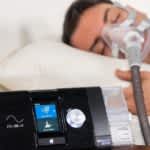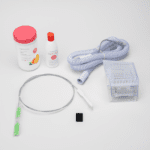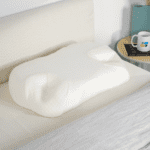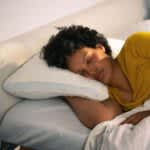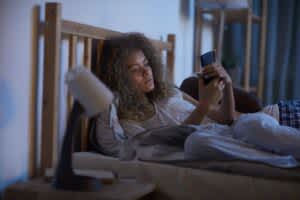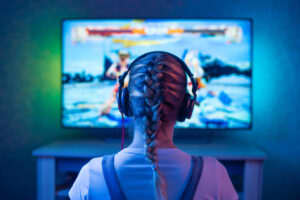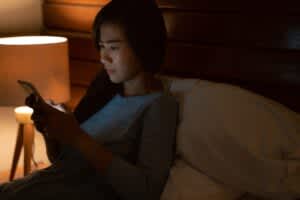Social media is ever-present in the lives of most Americans. Experts suggest that 72% of people use some form of social media, with many users accessing common platforms at least once a day.
Well-known social media sites such as Facebook, YouTube, TikTok, and Instagram allow users to message, video chat, and share personal content in online communities. These platforms can be a place for connection, entertainment, and news.
Unfortunately, a growing body of research suggests sleep health in teenagers and children may suffer because of electronic devices and social media use. More studies are needed to understand the relationship between sleep health and social media use in adults as their online activity increases. However, initial research suggests an association between sleep disturbances and social media use.
Learning about how social media could be impacting your sleep can empower you to develop healthy social media habits that encourage a better night’s sleep.
How Does Social Media Affect Sleep?
Research investigating social media and sleep is ongoing, but experts suggest that there are several ways that social media could influence whether people sleep well.
Blue light emitted from electronic devices used for exploring social media sites, the fear of missing out when offline, and noisy alerts and notifications are all known culprits of poor sleep health in the digital age.
Blue Light and Melatonin
People who scroll through social media on electronic devices in the hours leading up to bedtime or at night may encounter a range of sleep problems due to blue light exposure. These include trouble falling asleep, waking up earlier than expected, disrupted sleep, and more time spent sleeping during the day.
Melatonin is a hormone that promotes sleepiness. Your body naturally produces melatonin in the evening, after the sun goes down, as a part of your sleep-wake cycle. However, electronic devices, such as phones, tablets, and laptops, emit blue light that interferes with this process.
In response to light, including blue light, your body suppresses melatonin production. This is why blue light exposure before bed makes it more difficult to fall and stay asleep.
Fear of Missing Out
Fear of missing out, sometimes called FOMO, is associated with sleep loss and may lead to poor sleep quality. FOMO is a recent phenomenon that describes a sense of exclusion or concern about missing out when disconnecting from online communities.
For social media users that experience FOMO, the urge to check social media applications may be irresistible and constant, including at night when it is time to fall asleep and immediately upon awakening in the morning.
Disturbed Sleep
The “always-on” functionality of smartphones and social media applications disrupt sleep patterns. Devices like televisions and laptops can be turned off for the night, while persistent social media and message alerts—which often include a physical vibration or audible indicator—may occur at any time, disturbing sleep.
Excessive messaging before bedtime can negatively affect sleep as well. Unrelenting notifications and alerts from social media and smartphone apps in the evening can make it difficult to relax and prepare for restful sleep. Research indicates that difficulty falling asleep due to constant notifications can lead to sleep deprivation.
Effects of Social Media on Youth
Nearly all U.S. adolescents have access to a smartphone, and the percentage of youth that describe themselves as being “constantly online” grows each year. The increased time spent engaging with online communities using social media can negatively affect adolescent sleep.
Research shows that teenagers that frequently use social media are at risk for waking up too early and may struggle with going back to sleep. Teens who use social media may take longer to fall asleep and have poor sleep quality.
Getting a healthy amount of sleep is important for people of all ages, including children and adolescents. Adequate sleep can help prevent injuries, poor physical and mental health, and problems with behavior and attention.
Recommendations to Sleep Better
Social media users looking for a better night’s sleep may benefit from adjusting their sleep habits. A bedtime routine and sleep environment that encourage healthy social media habits may reduce or prevent the harmful effects of social media on sleep.
- Avoid Screen Use Before Bed: Using electronic devices to interact on social media platforms at night can lead to poor sleep quality. Avoid or limit screen time use in the hours leading up to bedtime and once in bed.
- Silence Notifications: Alerts from social media and other device applications may disrupt sleep and lead to sleep problems including daytime sleepiness. Turn off notifications to keep your device quiet throughout the night and to deter you from checking updates or responding to messages.
- Relocate Bedside Devices: Consider moving devices that allow access to social media to another location in your bedroom or home while you’re in bed to avoid notifications and scrolling through social media sites from bed.
- Make Time to Unplug From Devices: Experts suggest taking scheduled social media breaks to reduce your time spent on devices. During the time you unplug from your device and social media accounts, you may find it helpful to connect with friends offline, exercise, or explore activities that allow you to relax.
- Support Healthy Social Media Use in Teens: If you are involved in the care of a teen or child that uses social media, it is important to model healthy boundaries around social media and electronic device use. This includes establishing rules for when and where your teen can use devices and social media and setting limits on how much time they spend engaged with their device.
References
Ask the Sleep Doctor
Have questions about sleep? Submit them here! We use your questions to help us decide topics for articles, videos, and newsletters. We try to answer as many questions as possible. You can also send us an email. Please note, we cannot provide specific medical advice, and always recommend you contact your doctor for any medical matters.


